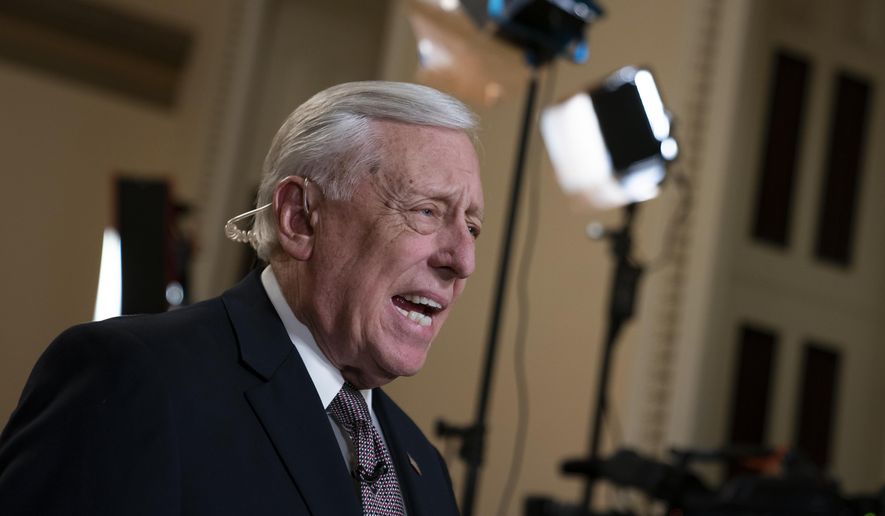Democrats continued to send mixed messages on the House Judiciary Committee’s impeachment investigation on Wednesday, with prominent lawmakers tip-toeing around the I-word.
While Chairman Jerry Nadler has doubled down on characterizing his committee’s work as part of formal impeachment proceedings, other Democrats are unsure exactly what label to use.
Majority Leader Steny Hoyer contradicted the chairman Wednesday morning, telling reporters he did not believe an impeachment inquiry was underway in the House Judiciary Committee.
“I do not believe the nature of what is going on has changed,” he said. “I think the delineation ought to be whether or not they’re considering a resolution of impeachment.
“I don’t want to be simplistic about it but I don’t want to quibble on words, either,” he added.
However, several Democrats on the panel, including Reps. Ted Lieu and Jamie Raskin, argue they’re already conducting an impeachment inquiry — and have been doing so for a while now.
“The impeachment proceedings have been under way, by which I mean the proceedings to determine if there should be articles of impeachment,” Mr. Raskin, Maryland Democrat, said.
Mr. Hoyer later walked back his comments, issuing a statement saying he thought the question was whether the full House was considering articles of impeachment.
Other members of leadership have avoided using the term impeachment altogether.
Reps. Hakeem Jeffries, Democratic Caucus chairman, and Adam Schiff, House Intelligence chairman, both declined to say whether they consider the judiciary committee’s work to be an impeachment investigation.
As a member on the House Judiciary Committee, Mr. Jeffries gave his support for Mr. Nadler but said the committee would “make some determinations as to characterization” on Thursday.
Mr. Schiff, whose own committee is investigating the president, said his focus is on how Democrats are doing in their legal battle to enforce their subpoenas.
“What matters most to me is do we meet the definition required to get grand jury information in court. I believe we do. That requires that we be in a judicial proceeding or preliminary to one,” he said.
Most notably, House Speaker Nancy Pelosi has declined to use the phrase “formal impeachment investigation.”
But she hasn’t explicitly shut down the talk, either.
Rather, she and her top lieutenants are focusing on the substance of the investigation and overall Democratic strategy, while dismissing confusion as a distracting argument over word choice.
“I don’t want to get caught in semantics,” Mr. Jeffries told reporters. “We are charged with being a check and balance that includes oversight over the executive branch and the president. That’s what six committees are doing, not simply the judiciary committee.
“The committees should be allowed to do their work without getting caught up into semantical distinctions,” he added.
Ultimately though, the quibbling over word choice has left parts of the caucus describing entirely different practices.
Rep. Harley Rouda, California Democrat, told The Washington Times Monday that he understood the committee was “working on a framework for an impeachment inquiry,” despite Judiciary Democrats saying it was ongoing.
Rep. Lucille Royal-Allard, who endorsed an impeachment inquiry not long before the August break, told The Times she understood the committee was looking into whether to move forward on impeachment but felt describing it as “formal” impeachment proceedings was confusing.
“What I’m hoping is that we will have a caucus and that the chair and leadership will be there and explain to us exactly what’s happening,” she said.
Some members are hopeful that kind of clarification will come after the committee votes Thursday on procedural rules for the investigation.
The new procedures would allow Mr. Nadler to create subcommittees to review evidence, expand time committee staff can question witnesses, and give the president’s legal team access to some evidence as well as an opportunity to respond in writing.
Mr. Raskin said that there’s no constitutionally-defined term for an impeachment investigation, but is confident the party will be on the same page on how to move forward.
“The words investigation or inquiry don’t appear in the Constitution,” he said. “We’re going to have a unified message on how to proceed and then put the focus on presidential misconduct.”
• Gabriella Muñoz can be reached at gmunoz@washingtontimes.com.




Please read our comment policy before commenting.